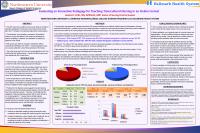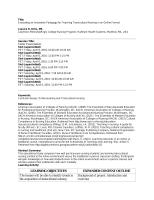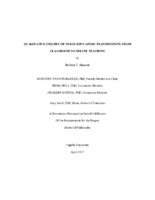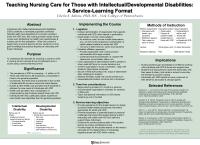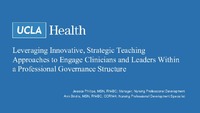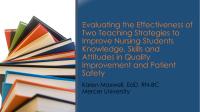| dc.description.abstract | Session presented on Saturday, April 9, 2016, and Friday, April 8, 2016: Background and significance: Online learning is frequently utilized in higher education in an effort to meet the needs of the changing educational landscape. This includes the intergenerational students of both Generation Y and Z in higher education as well as the ever-evolving technology in the classroom (Billings & Halstead, 2012). Findings from the literature review suggest that student learning outcomes are at the least equivalent between online formats and face to face classroom lectures. Some findings suggest that online learning is associated with improved scores on standardized testing (Stack, 2015). However, most studies report either non-nursing programs, or RN-BSN programs and graduate nursing programs. There is limited evidence supporting the use of online, and blended learning environments in associate degree nursing students and thus the question remains whether these types of learning opportunities can be used effectively in this population. Purpose: The purposes of this educational initiative are to: (1) introduce an alternative modality to teach transcultural nursing competency within an existing adult medical-surgical nursing course and; (2) compare the alternative, online modality with the traditional, face-to-face classroom delivery of transcultural nursing content by evaluating the student's knowledge, confidence, and satisfaction in meeting the objectives of the module. Project design: This pilot study uses a posttest 2-group survey design to evaluate an alternative pedagogy for introducing a transcultural nursing module within the second semester of an associate degree nursing program. This alternative, online modality is compared to the traditional classroom, face-to-face delivery of the content by evaluating the student's knowledge, confidence, and satisfaction in meeting the objectives of the module. This cohort of nursing students consists of two divisions, day and evening/weekend students. Group 1 consisting of day division students received online delivery, while Group 2 consisting of evening/weekend division students received traditional onsite delivery of the module. Both groups were asked to voluntarily complete a brief demographic survey prior to the content delivery and then complete the Jeffreys Transcultural Self-Efficacy Tool (TSET) (2010), and a course satisfaction survey following delivery of the module. The TSET, an established valid and reliable tool is utilized to measure perceived knowledge and confidence of the material with internal consistency ranging from .94 to .98, and reliability.99. The TSET consists of 3 parts; part 1, questions 1-25, measures perceived knowledge, and parts 2 and 3, questions 26-83 measures perceived confidence. To measure satisfaction, a standard Likert scale course standard evaluation survey is utilized. The surveys and TSET take 20 minutes and students are given class time to complete. Inclusion criterion is enrollment in the adult nursing practice course; be at least 18 years of age, and where English is not the primary language, pass an English proficiency test. The sample size for this pilot study is estimated to be approximately 30 day division students, and 30 evening/weekend division students. Results: Data analyses are pending. Demographics, posttest measurements, an outcome evaluation and course satisfaction tool are used to evaluate this pilot program. Ethical considerations: Approval for this quality improvement educational project was obtained from the University. Although there are no direct benefits to the students, they will have the opportunity to attain the requisite knowledge, skills, and competencies identified by the American Association of Colleges of Nursing (AACN) (2015) to provide culturally aware care. Students may decline completing the demographic survey, TSET tool, and satisfaction survey as these are voluntary. Significance for nursing education and practice: Transcultural nursing competencies were selected because they are threaded throughout the nursing education spectrum as evidenced by the AACN publication, The Essentials of Baccalaureate Education for Professional Nursing Practice (2008), The Essentials of Masters Education in Nursing, and The Essentials of Doctoral Education for Advanced Nursing Practice (2006). The National Organization of Nurse Practitioner Faculties (2012) also weaves cultural nursing competencies throughout its nurse practitioner core competencies of health delivery systems and ethics competencies. Given the importance of transcultural nursing in healthcare, it is imperative that the most effective mode of transferring this information to students is utilized. It has been documented that online education is growing at a faster rate than the overall higher education market (Billings & Halstead, 2012). Many nursing schools offer some form of online learning and while an increase in online learning modalities is an exciting venture for nursing programs, it is important that there is evidence to support the use of these alternative learning strategies (Billings & Halstead, 2012). This project aims to add to the evidence of utilizing online learning modules in AD nursing students. Anecdotally faculty discuss the face to face classroom delivery as providing more clues to the students' understanding of concepts and being able to tailor teaching to this nonverbal behavior. The subtleties and nuances of face-to-face role modeling in the classroom are arguably missing in the online environment. This initiative is an important first step in understanding how well students learn in an online environment and will serve as a pilot project to gain further insight into this topic area to guide future research. | en |
